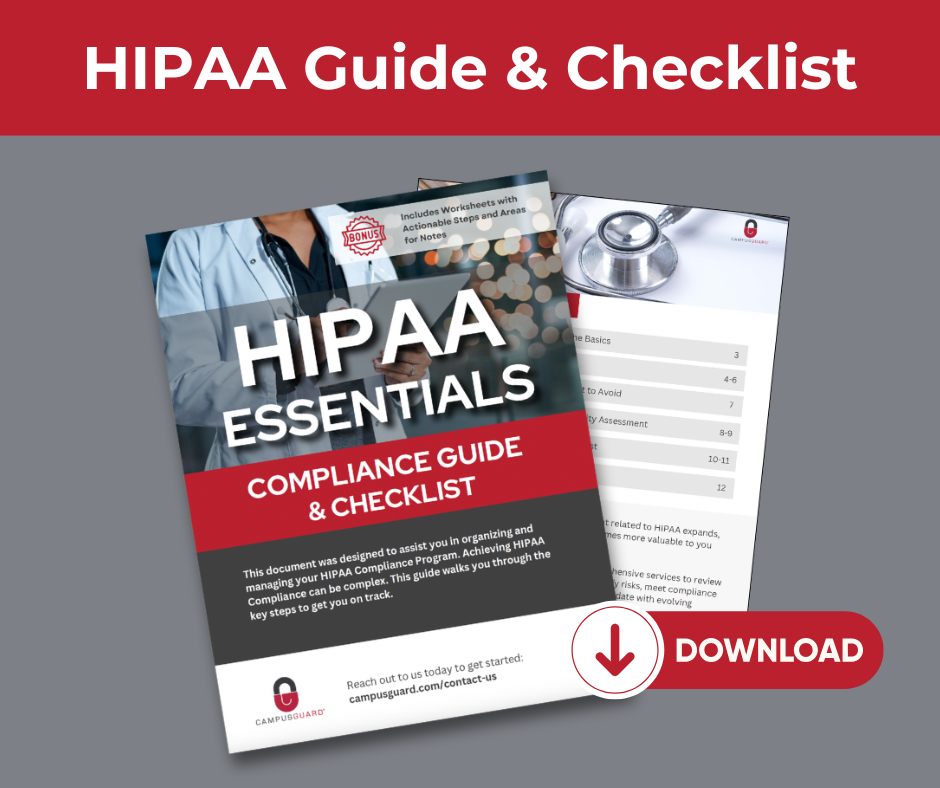HIPAAHealth Insurance Portability and Accountability Act
We help protect your patient records, identify vulnerabilities, and maintain HIPAA Compliance

Ensure the Security of Patient Information
As the regulatory oversight related to HIPAA expands, ensuring compliance becomes more valuable to you and your customers. CampusGuard offers comprehensive services to review safeguards to help you identify risks, meet compliance requirements, and keep up-to-date with evolving changes.
Common Violations
HIPAA Offerings
Whether your data resides on your core electronic health records system, patient intake forms, medical devices, wearables, or in the cloud, we provide a refined approach for data protection that satisfies HIPAA regulations with deep-dive, technical capabilities to improve your security posture.
-
HIPAA Assessment
Our HIPAA Assessment will help your organization find vulnerabilities within your network that could keep you from achieving HIPAA compliance. -
Security Awareness Training
Our online training courses are designed specifically for campus-based organizations to provide all employees and third-parties that access your organization's computer systems, networks, and information with the knowledge to protect and reduce the risk to sensitive information loss and theft. Training courses can be delivered to you either as SCORM-compliant modules for use on your Learning Management System (LMS) or can be delivered via our fully hosted, robust LMS. -
HIPAA Security Rule Gap and Compliance Assessments
CampusGuard will work with your organization to identify deficiencies between your current policies and practices, and the Security Rule. -
Comprehensive Customer Service Delivered Through an Annual Support Agreement
Our dedicated Customer Advocate Team provides ongoing guidance, support, and personal care as your environments and processes continue to evolve. Backed by an array of compliance and offensive security experts, the CampusGuard team will consult with you whenever you have questions, providing guidance regarding the intent of compliance controls and remediating any flaws in your cybersecurity.
Download the HIPAA Essentials Guide & Checklist
Stay compliant with the latest HIPAA requirements by downloading HIPAA Essentials Compliance Guide & Checklist—our comprehensive guide featuring:
- HIPAA Compliance Overview & Basics
- HIPAA Compliance FAQs
- Common HIPAA Violations and What To Avoid
- Benefits of a Third-Party HIPAA Assessment
- HIPAA Compliance Preparation Checklist
- Additional help & resources
HIPAA Online Training Course
Periodic training for all employees who are involved in any capacity in the processing, storing, and/or transmission of protected health information (PHI) is required according to the HIPAA Privacy and Security Rules.
Modules for our HIPAA online training course include:
- Introduction to HIPAA
- Protected Health Information
- Who Must Comply with HIPAA
- HIPAA Privacy Rule
- HIPAA Security Rule
- Risks to Protected Health Information (PHI)
- Data Breaches and Reporting
- HIPAA Enforcement

Why Choose CampusGuard?
Compliance needs can change as quickly as the healthcare industry evolves. Managing your scope and potential gaps can be an overwhelming task. The team at CampusGuard maintains the highest level of knowledge with regards to the HIPAA Rule and will work directly with your team to walk you through the process of achieving compliance.
Explore HIPAA Resources
Access our most popular content for tips, actionable steps, and valuable insights into how to achieve HIPAA compliance, avoid HIPAA violations, HIPAA Awareness Training, the benefits of a third-party HIPAA assessment, and more!
Achieve HIPAA Compliance with These 10 Steps
CampusGuard can assist your organization or hybrid entity in achieving HIPAA compliance by implementing the following 10 steps.
HIPAA Compliance Essentials: Benefits of a Third-Party HIPAA Assessment
This video discusses the benefits of conducting a third-party HIPAA Compliance Assessment. If you manage your organization’s HIPAA compliance program, this video will help you remain confident in meeting compliance requirements.
FERPA vs. HIPAA: Understanding the Differences for Higher Education Institutions
In this video, we discuss HIPAA and FERPA and the differences as they apply to higher education institutions. FERPA and HIPAA are both designed to protect sensitive personal information and prevent anyone without authorization from accessing the information. When it comes to protecting sensitive information, understanding which regulations and laws apply is key.
HIPAA: Common Violations and How to Avoid Them
Failure to comply with HIPAA can lead to significant financial penalties. Here are a few of the more common (and preventable!) incidents that can lead to breaches of protected health care information.
6 Benefits of a Third-Party HIPAA Security Assessment
Learn six benefits of partnering with a third-party organization to conduct a HIPAA security assessment to comply with the HIPAA Security Rule.
HIPAA vs. FERPA: High Level Guidance for Higher Ed
Colleges and universities maintain medical information in various ways and locations. While this personal information does indeed need to be protected, not all of those guidelines fall under HIPAA.
HIPAA Awareness Training Requirements
The HIPAA Privacy Rule requires covered entities to train workforce members on the privacy policies and procedures that govern the use and disclosure of PHI, as necessary and appropriate for employees to perform their job duties.
Related Products and Services
We Give Your HIPAA Compliance Program a Check Up
No matter where your organization currently stands in terms of HIPAA understanding and compliance, CampusGuard is there to support you in creating the most secure environment for your customers' healthcare information.
"CampusGuard has been a long term partner of Oakland University since 2019 and has partnered on a variety of initiatives including GLBA, HIPAA, PCI, Table Top Exercises, and penetration testing. Their ongoing consulting/QSA support services have been extremely valuable in helping OU to refine and mature our security and compliance programs. In particular we really appreciate CampusGuard's flexibility and quick response time, for example promptly arranging a call to discuss how a proposed purchase or architecture change may impact compliance."
Top HIPAA Frequently Asked Questions
HIPAA, which stands for the Health Insurance Portability and Accountability Act of 1996, is a US federal law that sets national standards for protecting the privacy and security of patients' sensitive health information, such as medical records, test results, and health insurance information.
HIPAA also establishes rules for how healthcare providers, health plans, and other covered entities can use and disclose patients' health information, and gives patients certain rights with respect to their health information, such as the right to access and request corrections to their medical records.
The primary goal of HIPAA is to ensure that patients' health information is kept confidential and secure, and that patients have greater control over their own health information.
HIPAA applies to covered entities including healthcare providers, health plans, and healthcare clearinghouses that transmit health information electronically. Examples of covered entities include hospitals, doctors, clinics, health insurance companies, and Medicare.
HIPAA also applies to business associates, which are entities that provide services to covered entities and have access to patients' health information, including billing companies, data processing companies, and third-party administrators
Some of the most common HIPAA violations include:
- Failure to properly secure electronic health information: HIPAA requires covered entities to implement appropriate administrative, physical, and technical safeguards to protect electronic health information.
- Unauthorized access to patient information: HIPAA requires covered entities to limit access to patient information to only those employees or business associates who need it to perform their job duties.
- Failure to provide patients with access to their health information: HIPAA grants patients the right to access and obtain copies of their own health information.
- Failure to provide proper training: HIPAA requires covered entities to train their employees and business associates on privacy and security rules.
- Breach notification failures: HIPAA requires covered entities to notify patients in the event of a breach of their unsecured health information.
- Disclosure of patient information to unauthorized individuals: HIPAA requires covered entities to obtain written consent from patients before disclosing their health information to anyone who is not involved in their treatment, payment, or healthcare operations.
Failure to comply with these requirements can result in a HIPAA violation.
Are You Up to Date on HIPAA's Latest Rules and Changes?
Discover the new provisions of the HIPAA Final Rule that went into effect on June 25, 2024, and compliance steps your organization needs to take.
Latest HIPAA Rules & Changes about the Are You Up to Date on HIPAA's Latest Rules and Changes?






